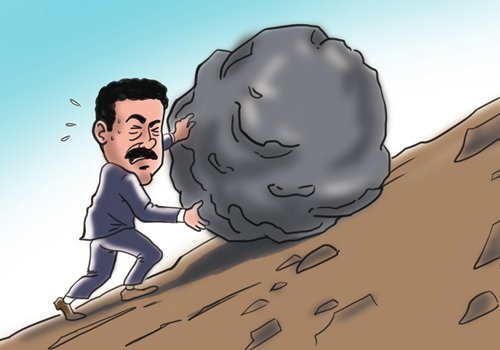
Illustration: Liu Rui (Photo: Global Times)
Nicolas Maduro's victory in Venezuelan presidential elections last week comes as no surprise. Amid a divided opposition, Maduro won 68 percent votes that sealed another six-year term for the Hugo Chavez protégé. However, it will be no smooth sailing for him as the country is mired in turmoil at home and abroad.
Venezuela holds the world's largest proven oil reserves and its development is dependent on oil prices. Its revenue from petroleum exports accounts for more than 50 percent of the country's GDP and roughly 95 percent of total exports.
During the tenure of Chavez, Venezuela rode on global oil price rise and became stronger. As crude oil prices fell sharply in the fourth quarter of 2014, the nation's rapid growth came to a sudden stop. In the Post-Chavez era, Maduro has been faced with an imperiled economy and continuous political and social upheavals.
Declining oil prices caused an economic crash and shrunk Venezuela's revenues. A mountain of debt during the Chavez era had already weakened the economy. Hyperinflation in the country is estimated to reach 13,800 percent this year with dire shortages of food and medicine forecast. The government will have to continue to expand external debt and strengthen currency controls, further entrapping the economy.
Recession caused a large decline in oil production, which is currently estimated at 1.5 million barrels per day (bpd) - less than half the 3.2 million level in 2007. S&P Global Platts claims the oil ministry's worst-case scenario is a projection of 1.2 million bpd by December this year, which will further hurt the economy.
Disputes among political groups led to a deadlock. Since Maduro assumed office in 2013, he has encountered violent protests organized by the opposition party enthused by a two-thirds majority in parliamentary elections in December 2015. On April 7, 2017, Venezuelan politician Henrique Capriles, seen as the main contender to challenge Maduro in presidential election, was barred from holding public office for 15 years, exacerbating the conflict between government and the opposition.
Although the presidential election was smooth, rifts between political groups still exist. Maduro's closest contender Henry Falcón said he would not recognize the election because of irregularities. Another reason that led to the victory of the United Socialist Party of Venezuela is the low turnout in elections with only 17.04 percent of the 20.7 million registered voters coming out to vote. This shows public disenchantment with the political process.
During the Chavez administration, thanks to rapid economic development and welfare policies, a large number of laborers rose to the middle class. But with the economy on the brink of collapse, some of the middle class have slid back into the lower income bracket. Hardships made them extremely dissatisfied with vested interests in the upper strata. Sharp confrontation among social classes is tearing the society apart.
On the international front, Venezuela is also in hot water. Since US President Donald Trump took office, Washington has repeatedly expanded economic and financial sanctions against Venezuela on grounds of democracy and human rights. After the presidential election, countries including Turkey, Cuba, Bolivia, El Salvador and Russia recognized Maduro's victory, while the US, the EU, Brazil, Peru, Panama and other Latin American countries rejected the results.
Trump signed an executive order prohibiting US citizens and enterprises from purchasing any debt owed to the government of Venezuela. The US is also weighing sanctions that would target Venezuela's oil industry, which will deal a devastating blow to Venezuela's economic and political stability.
In early May, the IMF threatened to expel Venezuela for failing to provide key economic data. Once expelled, the country will find it difficult to obtain financial assistance from Western financial institutions, putting its cash lifeline into jeopardy.
It's urgent for Maduro to take measures to bring the country out of the domestic and international crises. Economically, he should devote to revitalizing oil production, restructuring the economy and advancing anti-corruption measures. Politically, he needs to reach a compromise with opposition parties. Diplomatic efforts should be made to improve relations with other countries in the region, break the diplomatic isolation and resist Western interference. Only by taking action can Venezuela get out of the quagmire.


